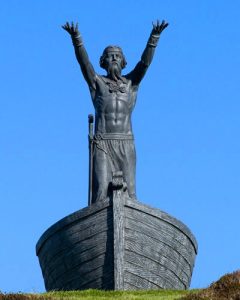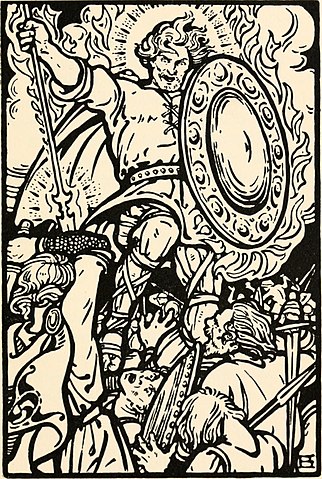In Irish mythology, few figures are as enigmatic and intriguing as Mongán mac Fíachna. A poet, prophet, and possible reincarnation of the legendary Fionn mac Cumhaill, Mongán stands at the crossroads of mortal and divine, memory and myth. His stories blur the lines between historical kingship and Otherworldly magic, making him one of Ireland’s most fascinating legendary characters.
Who Was Mongán mac Fíachna?

Mongán mac Fíachna was a semi-divine hero from Irish tradition, said to be the son of Fíachna Lurgan, king of Ulster, and Manannán mac Lir, the powerful sea god and guardian of the Otherworld. His name appears in early medieval Irish literature, and his tales are preserved in various prose texts and poetic fragments.
While he may have originated as a historical king of the 7th century, later stories elevated him to mythic status, blending real-world kingship with fantastical elements.
A Son of Both Worlds: Mortal and Divine
The origin story of Mongán is anything but ordinary. According to the tale Compert Mongáin (“The Conception of Mongán”), Fíachna Lurgan was preparing for battle when a mysterious warrior approached him with a bargain: if he allowed the stranger to spend a night with his wife, he would be granted victory.
Fíachna agreed, and the stranger was revealed to be Manannán mac Lir, the god of the sea. From that union, Mongán was born — a child of both king and god, blending mortal lineage with divine power.
This tale follows a mythological pattern seen in many cultures, where gods father children with mortals to create heroic or semi-divine offspring.
Mongán and the Memory of Fionn mac Cumhaill

One of the most remarkable aspects of Mongán’s legend is his claim to be the reincarnation of Fionn mac Cumhaill, the great hero of the Fenian Cycle. In several tales, Mongán demonstrates knowledge of events that only Fionn himself could have known.
In these stories, Mongán often corrects or challenges poets who have misremembered the exploits of Fionn and his warriors. His perfect memory of a past life sets him apart as a being who transcends time — a soul reborn with purpose.
This belief in reincarnation and continuity of heroic souls reflects an older spiritual worldview, where identity and wisdom could carry over through lifetimes.
Manannán’s Prophecy in The Voyage of Bran
Mongán’s birth is even foretold in one of Irish mythology’s great Otherworld voyage tales: Immram Brain (The Voyage of Bran). In this story, Manannán appears in a vision and speaks to Bran:
“A son will be born to you, O Bran,
Mongán of many deeds,
He will be nurtured in the Otherworld,
He will remember everything.”
Though symbolic, this prophecy ties Mongán’s origin directly to Manannán’s realm and places him firmly in the mythic tradition of Otherworldly heroes.
Poet, Prophet, and Trickster
Mongán is often portrayed as a master of poetry and knowledge, embodying the highest ideals of the Irish fíli (poet-seers). He uses riddles, prophetic insight, and even deception to test the knowledge of others and protect sacred truths.
In several tales, he journeys to the Otherworld, engages in clever wordplay, and interacts with mysterious figures. His wisdom surpasses that of mortal men, and his ability to manipulate perception links him closely with his foster father, Manannán, who is also known for his illusions and transformations.
Connections to Other Mythological Figures
| Character | Connection |
|---|---|
| Manannán mac Lir | Divine father or foster-father, god of the sea and Otherworld |
| Fíachna Lurgan | Mortal father, king of Ulster |
| Fionn mac Cumhaill | Mongán claims to be his reincarnation |
| Bran mac Febail | Subject of the prophecy foretelling Mongán’s birth |
| Uillend | Companion in a tale of riddles and Otherworldly adventure |
These links show Mongán not as an isolated figure, but as a bridge between Ireland’s mythological cycles — connecting the Ulster, Fenian, and Mythological traditions.
Was Mongán a Real Person?
It’s possible that Mongán was originally a historical king, specifically Mongán mac Fiachna (d. 625) of the Dál nAraidi in Ulster. Over time, stories about him were mythologised, attributing supernatural powers, divine parentage, and past lives to his name.
This blending of history and myth is common in early Irish literature, where legendary figures often take on the roles of both hero and semi-deity.
Legacy of Mongán mac Fíachna
Mongán mac Fíachna represents the fusion of old and new, of bardic wisdom and Otherworldly insight, of mortal kingship and divine memory. Through him, the memory of Fionn mac Cumhaill lives on, not just in tales, but as a living soul reborn.
He reminds us that Irish mythology is not just about gods and warriors — it’s also about memory, identity, and the power of storytelling to transcend time.
Final Thoughts
As Irish mythology continues to capture imaginations around the world, Mongán mac Fíachna stands out as a timeless figure. Whether as a reincarnated hero, a prophet-poet, or the son of a sea god, Mongán’s story invites us to consider the boundaries between past and present, myth and memory.
Links:
Immram Brain (The Voyage of Bran) Archive.org
